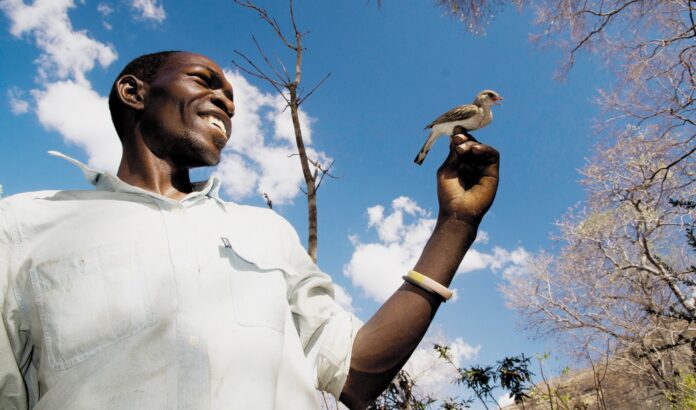The study explores a unique and mutually beneficial relationship between humans and honeyguide birds in Africa. The greater honeyguide, a small African bird, has been known to lead humans to wild bee nests. In return, humans open the nests to collect honey, while the honeyguides feed on the exposed beeswax. This relationship, which has likely existed for thousands of years, highlights a rare form of cooperation between humans and wild animals.
About Honeyguide Birds
Honeyguide birds are a group of about 17 species of birds that belong to the family Indicatoridae. They are found in the tropical regions of Africa and Asia. Honeyguides are among the few birds that can eat and digest beeswax, which is a rich source of energy for them. Some honeyguide species, such as the greater honeyguide and the scaly-throated honeyguide, have a unique relationship with humans. They guide human honey hunters to wild bee nests by making distinctive calls and flying from tree to tree. In return, the humans share some of the honey and beeswax with the birds. Honeyguides can learn and respond to different human calls that signal their readiness to hunt for honey. The calls vary across different human cultures and regions in Africa.
How the Study was Conducted
The study, published in Science, reveals that honeyguide birds understand and respond to culturally distinct calls made by human honey hunters in different regions of Africa. The researchers, Claire Spottiswoode and Brian Wood conducted experiments with honey hunters from the Yao cultural group in Mozambique and the Hadza cultural group in Tanzania. They played audio recordings of different honey hunter calls and observed how honeyguides from each area responded.
What the Authors Found
The findings indicate that honeyguides are more likely to initiate a guiding response to the distinct calls of their local human culture. For example, honeyguides in the Yao area responded more to the Yao’s trill followed by a grunt, while honeyguides in the Hadza area were more responsive to the Hadza’s melodic whistle. This suggests a form of cultural coevolution between humans and honeyguides, where the birds learn and respond to culturally specific signals.
Why is this important?
The study raises questions about the factors influencing cultural variations in human honey hunter calls and emphasizes the interdisciplinary nature of research in this area. The researchers hope to further explore the complexities of multi-species relationships and gain insights into the meanings embedded in collaborative communication systems between humans and birds.
However, the article notes that this unique human-honeyguide partnership is facing threats due to recent changes such as beekeeping, urbanization, and the exclusion of people from protected wild areas. The risk of losing this ancient aspect of human interaction with the natural world underscores the importance of conservation efforts to preserve such rare and culturally significant relationships.
















 The African Research (AR) Index is a comprehensive scholarly directory and database focused explicitly on journal publishers that publish and disseminate African research.
The African Research (AR) Index is a comprehensive scholarly directory and database focused explicitly on journal publishers that publish and disseminate African research.

